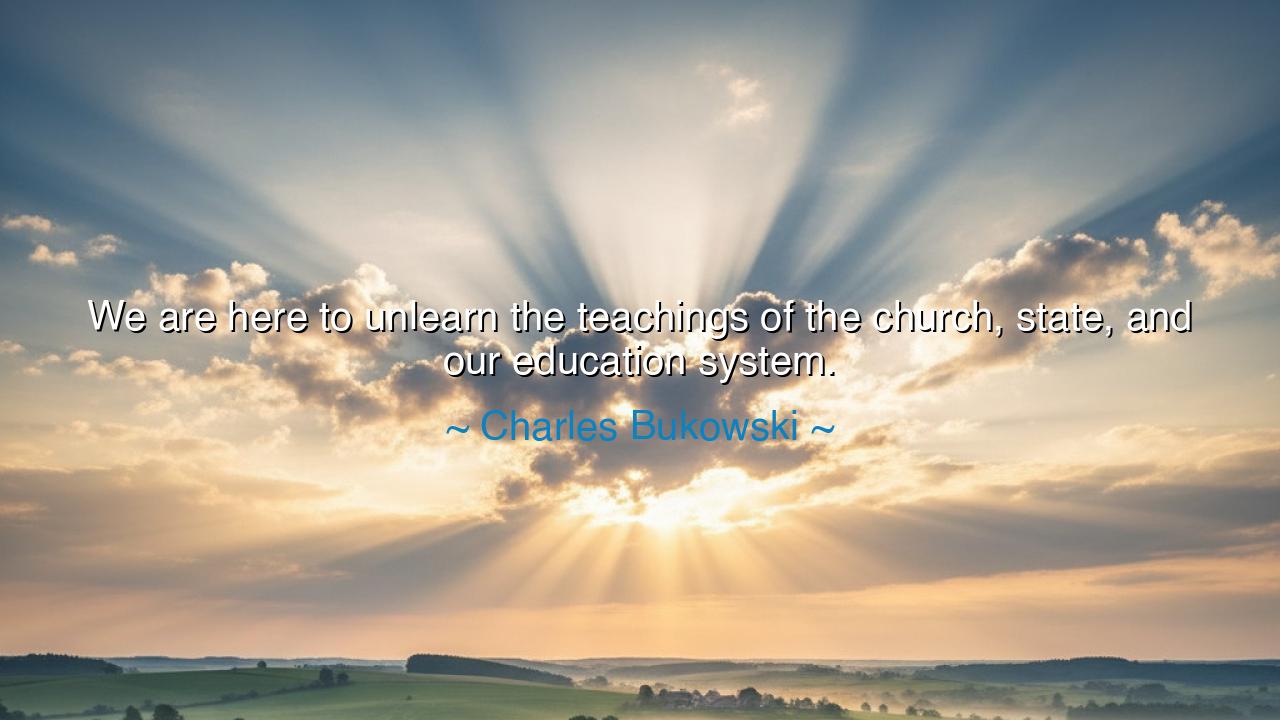
We are here to unlearn the teachings of the church, state, and






Hear the raw and unsettling words of Charles Bukowski, who declared: “We are here to unlearn the teachings of the church, the state, and our education system.” This is not the polished wisdom of philosophers nor the solemn decree of kings, but the cry of a poet who saw society’s chains hidden beneath the guise of tradition. In his words lies a thunderclap: that much of what we inherit as “truth” is not truth at all, but conditioning. Bukowski urges us to strip away falsehoods, to unlearn what enslaves the spirit, and to seek a freedom that is authentic, personal, and fierce.
To unlearn is no small task. It is harder than learning, for it demands that we question what has been carved into us since childhood. The church may teach doctrines that smother the individual’s search for meaning. The state may enforce loyalty to power rather than loyalty to truth. The education system may reward obedience more than creativity, memorization more than imagination. Bukowski calls us to rebellion, but not with swords—rather, with the mind itself. To unlearn is to rise against the invisible prisons of conformity.
History, too, is filled with those who dared to unlearn. Galileo, standing before the Inquisition, refused to accept the false teachings of the church that claimed the Earth was the center of the cosmos. His courage to cast aside indoctrination and cling to observation gave birth to a new age of science. Likewise, Martin Luther King Jr. called his people to unlearn the poisonous teachings of the state that decreed segregation and inequality. Through civil disobedience, he revealed that not all laws are just, and that true education lies in conscience awakened.
Yet, Bukowski’s words are not an invitation to nihilism, but to liberation. When we unlearn the rigid dogmas of the church, we make space for a faith that is personal and alive. When we unlearn blind allegiance to the state, we create citizens who think critically and demand justice. When we unlearn the limits of our education system, we rediscover curiosity, wonder, and creativity. Thus, unlearning is not destruction, but renewal—it is the clearing of old ground so that something true and living may grow.
Consider also the artists, inventors, and visionaries of the world. Picasso once said he spent his life learning how to paint like a child again. Einstein declared that imagination is more important than knowledge. Both understood what Bukowski proclaimed: that the deepest truths are often buried beneath layers of imposed teaching, and that greatness is found not in repeating what others have said, but in daring to see anew. To unlearn is to return to the freedom of the child, whose questions are endless and whose vision is unclouded.
The lesson for us is this: examine the beliefs you hold most tightly. Ask, Were they given to me by habit, or discovered by my own soul? Do not fear to challenge the voices of authority, for they too are human, and humans often err. Dare to stand in the wilderness of your own thought, even if it makes you lonely, for there you may find a truth not secondhand but lived.
Practical action follows: cultivate skepticism without bitterness, curiosity without limits, and courage without compromise. Read deeply, but also question what you read. Listen to teachers, priests, and leaders, but never surrender your conscience to them. Make your life an act of constant unlearning, stripping away what is false, keeping what is real, and remaining always open to what lies beyond.
So let Bukowski’s words burn in your mind: “We are here to unlearn the teachings of the church, the state, and our education system.” Take them not as a call to cynicism, but as a call to freedom. For only by unlearning the chains of the past can we learn the truth of ourselves, and only by freeing our minds can we begin to live—not as echoes of others, but as voices of our own.






AAdministratorAdministrator
Welcome, honored guests. Please leave a comment, we will respond soon